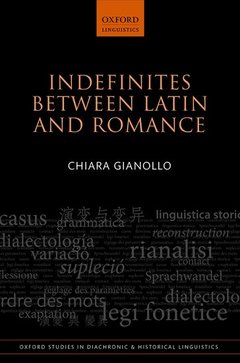Description
Indefinites between Latin and Romance
Oxford Studies in Diachronic and Historical Linguistics Series, Vol. 33
Author: Gianollo Chiara
Language: English
Subject for Indefinites between Latin and Romance:
Publication date: 12-2018
342 p. · 16.4x24.2 cm · Hardback
342 p. · 16.4x24.2 cm · Hardback
Description
/li>Biography
/li>
This book investigates the syntactic and semantic development of a selection of indefinite pronouns and determiners (such as aliquis 'some', nullus 'no', and nemo 'no one') between Latin and the Romance languages. Although these elements have undergone significant diachronic change since the Classical Latin period, the modern Romance languages show a remarkable degree of similarity in the way their systems of indefinites have evolved and are structured today. In this volume, Chiara Gianollo draws on data from Classical and Late Latin texts, and from electronic corpora of the early stages of various Romance languages, to propose a new account of these similarities. The focus is primarily on Late Latin: at this stage, the grammar of indefinites already shows a number of changes, which are homogeneously transmitted to the daughter languages, leading to parallelism in the various emerging Romance systems. The volume demonstrates the value of using methods and models from synchronic theoretical linguistics for investigating diachronic phenomena, as well as the importance of diachronic research in understanding the nature of crosslinguistic variation and language change.
Chiara Gianollo is Senior Assistant Professor of General Linguistics at the University of Bologna. She obtained her MA and PhD from the University of Pisa and has held appointments as lecturer and researcher at the Universities of Trieste, Konstanz, Stuttgart, and Cologne. Her main research areas are diachronic syntax and semantics, with specific focus on the use of formal theoretical linguistics to investigate the history of Greek, Latin, and Old Romance. She is the co-editor, with Agnes Jäger and Doris Penka, of Language Change at the Syntax-Semantics Interface (de Gruyter 2015).
© 2024 LAVOISIER S.A.S.
These books may interest you

Redefining Indefinites 105.49 €

Redefining Indefinites 105.49 €

Verb Second in Medieval Romance 125.23 €

